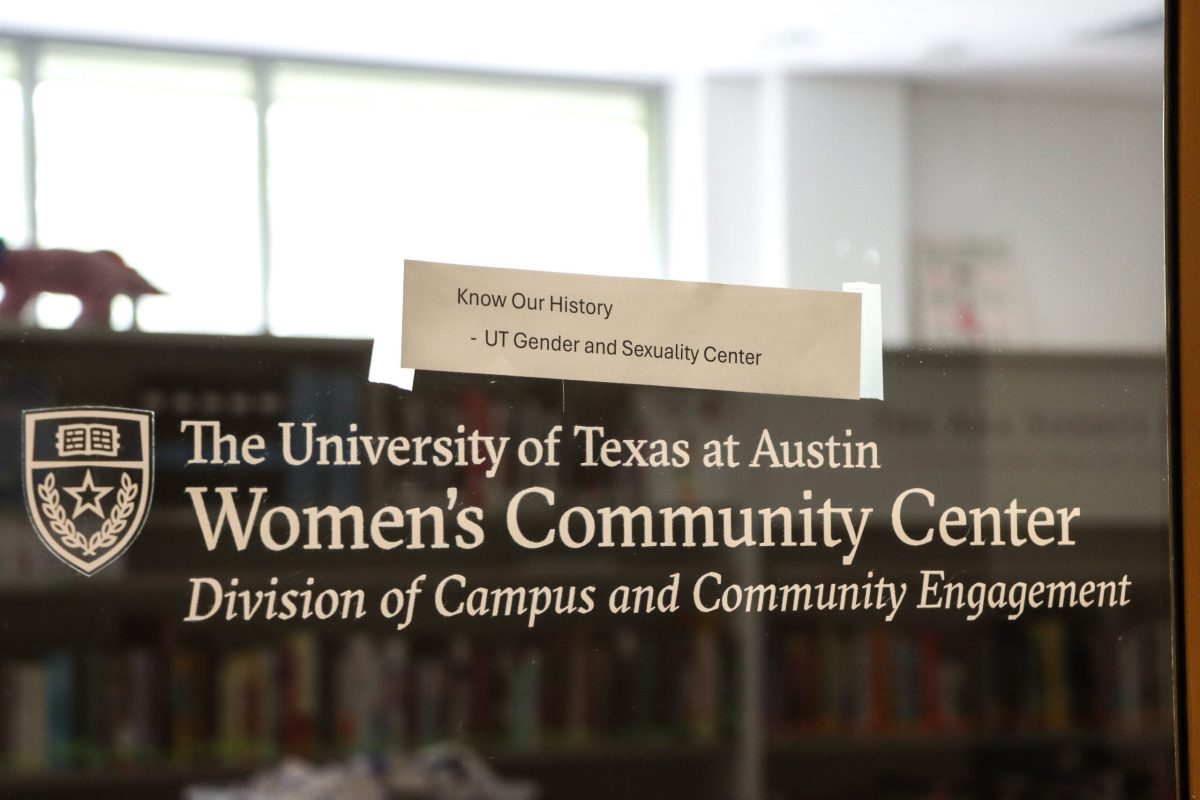Editor’s Note: For the safety of our staff writer, they have asked to remain anonymous.
Dear UT,
You made it impossible for marginalized students to feel safe here when you decided to comply with Senate Bill 17.
Your over-compliance with the “Anti-DEI bill,” banned offices, centers and training focused on diversity, equity and inclusion to prevent “special benefits” for individuals based on sexual orientation, race and economic status.
You took away the Women’s, Gender and Sexuality Studies Department’s right to sponsor student organizations which eliminated the Gender and Sexuality Center.
In the fall, before the new law took effect, the Women’s, Gender and Sexuality Studies Department and the Gender and Sexuality Center collaborated on events. Students could access a collection of LGBTQ+ books and artwork, and were free to express themselves. Now, it’s just the department hosting the events.
Along with the Gender and Sexuality Center, you also removed the Multicultural Engagement center, leaving a void in the hearts of marginalized students.
“We are dealing with a very harmful and negative law,” said Lisa Moore, chair of the Women’s, Gender and Sexuality Studies Department at UT.
Unfortunately, WGSS faculty can no longer sponsor undergraduate organizations relating to gender and sexuality, making them student-led instead of university-affiliated. You are failing marginalized students attending the University and I’m not the only one who thinks so.
Work-study student Tamara Abiakl shared she continues to work for the department because there are less resources on campus due to the new law, and it is important that we support the ones left.
“I think this department serves a very important purpose and cause and sheds light on a very important topic where the light is trying to be dimmed,” Abiakl said.
Michael Lopez, another department student employee, said his job allows him to engage with students from various backgrounds.
“I wanted to work somewhere where my identity was embraced,” Lopez said.
After January, the bill became a recurring talking point across campus, bringing unexpected obstacles. A target was placed on the backs of marginalized students on campus, and their daily lives will never go back to the way they were.
Students are fed up and no longer feel the connection that they once did to the University. For me, walking on campus is a daily reminder of the new law because every day I feel the need to advocate for myself and my community.
Many of my white counterparts think the new law is just a cut in funding or name changes. They think we’re okay– nothing is okay. For many, it was in their daily routine to go to the MEC and socialize with friends, it was a place to learn about on campus research from faculty. Some students looked forward to the collection of LGBTQ+ books in the Gender and Sexuality Center, but now there’s nothing.
On March 6, a wave of students posted #NotOurTexas on social media denouncing the University’s motto “Make it Your Texas.” It’s unfortunate that students no longer support the University they once loved. It is even more unfortunate that the University complied with SB 17 the way they did.
Jim Davis, UT’s chief operating officer and vice president for legal affairs, interpreted the new law and decided how the university would implement the legislation. His office declined to comment.
Davis formerly worked for Texas state Sen. Brandon Creighton, R-Conroe, an author of SB 17.
Creighton believes the bill will restore a “culture of free inquiry” and equality. Equality is defined as the state of being equal, especially in terms of status, rights, and opportunities. This bill removes opportunities for marginalized students, and ignores white privilege. If anything, it’s now more challenging for marginalized students to feel equal to their counterparts.
Creighton and Abbott have endorsed Donald Trump for president in the upcoming election.
It makes me question the integrity of your compliance to the bill due to its political ties. For now students can still study Black and Latinx culture, but it’s the community surrounding both that’s being threatened.
On top of many marginalized student organizations facing funding cuts, they’ve also faced challenges when booking rooms for meetings. The Texas Association of Black Journalists were told they can no longer book rooms under the Moody College of Communication. Since February, Texas ABJ have met in Corothers dormitory. This location change may seem meaningless, but this makes it harder for the association to establish themselves on campus.
During the Black Student Alliance’s Miss Black UT pageant practice, a staff member tried to kick them out of a room that they had booked for over a month. The staff member referred to everyone in the room as “you people.” Again, this may seem meaningless but this connects to racist slurs African-Americans have faced for centuries.
For me, when someone refers to me and others as “you people” I can’t help but think they have racist intentions. A law that calls for the removal of DEI across public universities, perpetuates a racist and prejudiced environment uplifting the agenda of white supremacists.
“We need to remember we have the same full and free access to these areas of study,” Moore said. “Any student and any teacher at the University of Texas can study (and) learn about diversity, equity, and inclusion.”
According to Moore, the ongoing research projects are beyond the authority of the Texas legislature, and knowledge about gender and sexuality studies will continue to develop.
That was until UT President Jay Hartzell sent an email on April 2 announcing the closing of the Division of Campus and Community Engagement. This comes after Senator Creighton warned the University of the decision to change titles rather than staff positions. 60 staff members have lost their jobs, 40 of them under the Division of Campus and Community Engagement.
The DCCE will officially be shut down at the end of the school year.
I was made aware of the new compliance before the email was sent out, and I immediately shut down mentally and physically. Fearless Leadership Institute, an organization housed under the DCCE, was created to make a space for Black women on campus to feel free and express themselves. The organization was open to everyone, so when they were told in January they could no longer target a certain demographic, nothing changed.
Now, Fearless Leadership Institute along with other organizations under the DCCE may not return next school year. I found a home in FLI, and now the faculty within my home is being removed because of you. Many students are calling for action as they are losing staff mentors, and are disappointed in you.
UT, do better. You say, “What Starts Here Changes the World” but, is this the change you want to make?
































